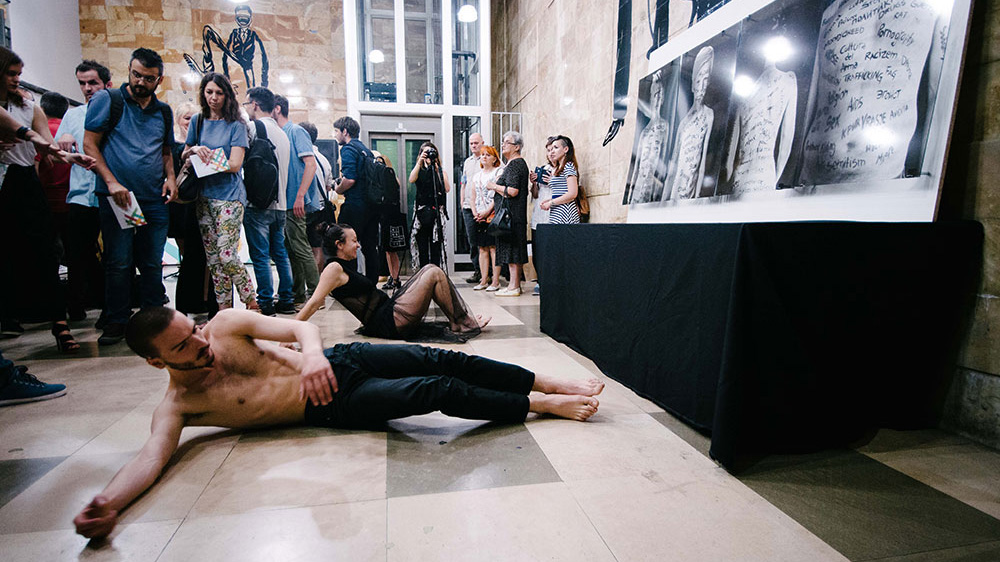Remember the groups of right-wing football fans who pillaged Belgrade during the Pride Parade, set fire to the embassies, destroyed the city and stole shoes over Kosovo, stormed the police over Radovan Karadzic’s arrest, and then suddenly disappeared in 2012, as if one of their own had come to power and made a non-aggression pact with them? Well, they’re back.
First they lined up in front of the Youth Center the day before yesterday in black uniforms and balaclavas on their heads, accompanied by a horde of football fans who chanted about Serbian Kosovo. They tried to enter the room where the fourth “Mirëdita, good day” festival, which presents the cultural scene of Kosovo, was planned to happen. The police managed to prevent them from doing so, because, among other things, they didn’t try really hard. As if they had an agreement.
Then, yesterday, they tried to break through a police cordon and enter Veljkovic Pavilion (CZKD) where, as part of the festival, a discussion on wartime rapes of women was taking place. There they got a bit carried away, tried to break through a police cordon, but quickly gave up (perhaps suddenly remembering the deal?) and went away.
These are, apparently, militant groups (or paramilitary, when the need arises) that were once used for attacks against the government, and now (and for now) to threaten political opponents. If we exclude football matches and football fan conflicts, we haven’t seen such groups in social and political life for years; they haven’t been in the streets since 2012. This seems like someone letting us know that they are still there. Just so we don’t relax too much.
Football fans’ performances were accompanied and supported by their fellow soldiers in civilian clothes, mostly youth. First, student members of the Serbian Political Club interrupted a panel discussion hosted by “Women in Black” at the Faculty of Political Sciences on Tuesday, then the right-wing group “Zavetnici” briefly disrupted the artists and visitors of the festival “Mirëdita, good day” at Youth Center and, finally, a man interrupted a debate at Veljkovic Pavillion, scheduled within the same festival, for about ten minutes.
There’s no talking with football fans, they do not talk, they shout, their faces covered with balaclavas. With these other groups, however, discussion is possible and necessary. While they’re still in civilian clothes.
The students who interrupted a panel discussion hosted by “Women in Black” need to know who they prevented from speaking. Not only Stasa Zajovic, who, incidentally, has done more for Serbian victims of war than the whole state of Serbia, but also Marica Seatovic, a woman who spoke at „Women’s courts“ about violence against Serbs in Novska and the fate of her husband, who was murdered because of his nationality. Zavetnici and their leaders should be aware that they interrupted an artistic performance which opposes violence against women. All women, regardless of their nationality. And a man who was yelling at participants of the panel at the Pavillion should keep in mind that they also spoke about raped Serbian women. If the fact that victims of other nationalities were also mentioned is what bothers them, then forget everything I said. But, they should know that “Women’s Court” is not an anti-Serbian court and that “Mirëdita, good day” is not a festival promoting Kosovo politicians, but artists who oppose those (Kosovo) politicians more resolutely and courageously than any Zavetnik or football fan.
Whether they understand it or not, they have the right to express themselves by singing songs and interrupting (but not preventing) debates, no question about it. The same right that the activists of Youth Initiative for Human Rights had in Beska when they were beaten for doing the same thing, i.e. interrupting a panel discussion (the difference is that a war criminal, and not a victim, was speaking at that debate). Let it be noted that, to this day, no one was held accountable for that.
So, we have students and pupils on the one side and football fans and hooligans on the other. We can talk with the former; the state has to talk with the latter. And keep them off the streets.
The author is a researcher with the Humanitarian Law Center.
Translated by Marijana Simic
Peščanik.net, 08.06.2017.



